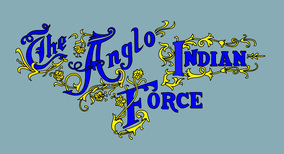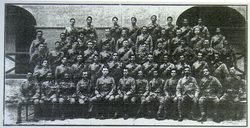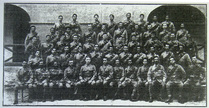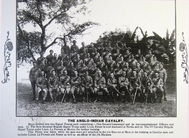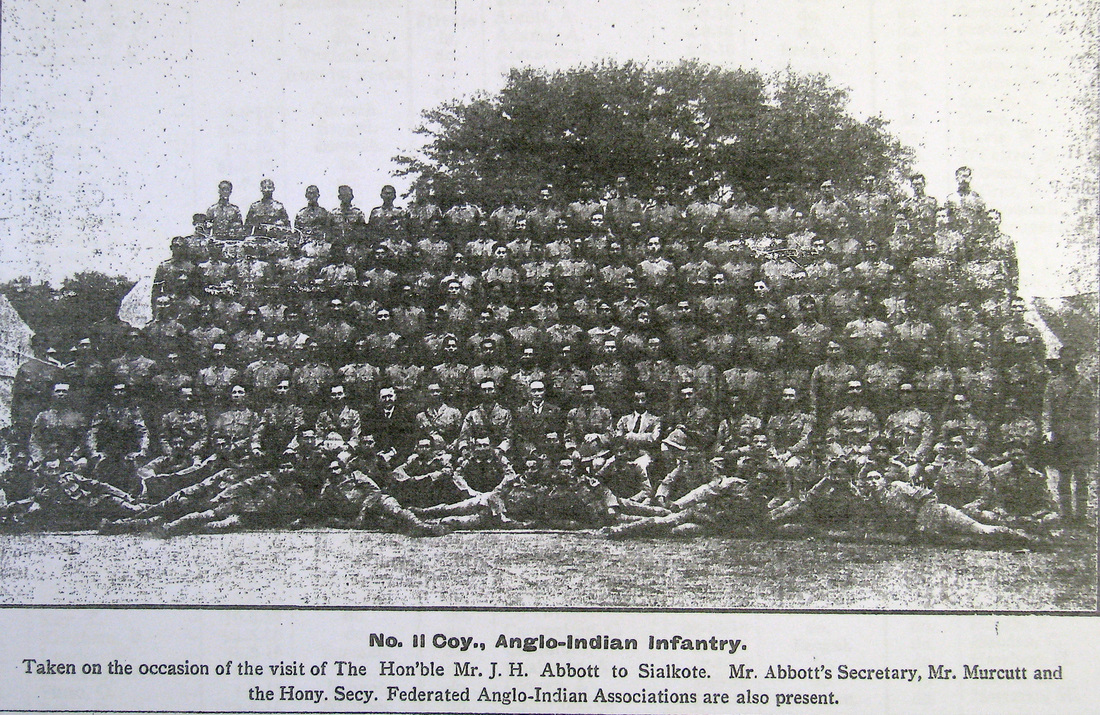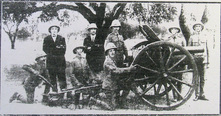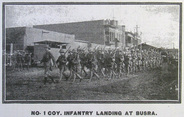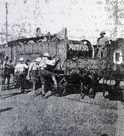Sentry Page Protection
Please Wait...
World War One - The Anglo Indian Force
Anglo-Indian Cavalry, Anglo-Indian Battery, Anglo-Indian Infantry
The following extracts are taken from "The Anglo-Indian Review"
The Battery's Return
The Battery's Return
|
"I am directed to inform you that the Anglo-Indian Battery will return shortly from Mespotamia...
On the 16th March 1916, sanction was given for the raising of the A.-I. Force. The fact that when war was declared an offer to raise a separate Anglo-India Regiment was made and declined has long since become public property though the reason why this patriotic offer was then refused is still shrouded in the mists of obscurity. Snubbed as a race the Anglo-Indian might well have stood on his dignity and taken no further interest in the dread struggle which later on was to rock the world. As records prove, however, thousands undaunted by the rebuff immediately set about accomplishing their object and that too so successfully that on the date of sanction for the Force so many of the best had already gone to one or other of the various Fronts that it was feared attempting at so late a date to raise separate units would only end in disaster. Once again however, patriotism prevailed and the leaders determined to attempt what by many was considered an impossibility. Businesses, schools and colleges were tapped and in a very short period the number required for the Battery was completed. As it stands to-day the number first asked for has been reached four times over. That the Battery has been a success we have the direct testimony of two high British Officers than who no on is better fitted to express opinion. Their time of trial is over, the Battery has emerged triumphant and the community is proud of its record. The men are now on their way to India for demobilization... J.G. Abbott desires to take this opportunity of warmly thanking the men of the Battery for the worthy manner in which they upheld the best traditions of their forefathers and thus have written a page in the history of Anglo-Indians of which he and the whole Community are justly proud. He extends to all ranks a cordial welcome back to Indian and while rejoicing in the safe return of so many desires at the same time to pay honourable tribute to the memory of those who, during the campaign, have made the last great sacrifice and whose places in the Battery are empty to-day. They have given their lives in the sacred cause of King, Country and Community and their names are enshrined in the loving memory of their fellows. To all who to-day mourn the absence of loved ones who will never return the deepest sympathy of the whole Community unreservedly go out.... .... We have proved beyond doubt that we are worthy sons of a great Empire; that in our hands the Honour and Glory of the Army and country can safely be placed. In short, that we are, what we rightly and proudly claim to be "Chips of the old block," "Sons of the old Brigade." My position to-day is that of President of the A.-I. E. League; and as such, on behalf of the entire Anglo-Indian and Domiciled European Communities of India and Burmah, I offer you a warm and proud welcome.... In our welcome we do not forget our gallant lads who have paid the supreme sacrifice and whose graves adorn other lands. Such deeds are never forgotten but live through the ages. Their death had meant our victory; their sacrifice the undying honour of A.-I. To all their relatives we offer our deepest sympathy. From their tribulation springs a new life for the Community and surely the Community will live that life nobly and well. They cannot do less, in honour to all who have fought and fallen.... Continuing Col. Gidney said - None have worked harder than these two gentlemen to secure our recognition as a fighting force. With their names I have great pleasure in equally associating Mr Ingles of the Calcutta A.-I. Assoc., Mr Richmond of the Madras A.-I. Assoc., and the Hon. Mr Du Bern of the Burmah Branch of the A.-I. E. League... The Anglo-Indians who went out at the outset, were Volunteer Artillery, which was so splendidly assisted by the Hon. Mr Du Bern, President of the Burmah Anglo-Indian Empire League. The deeds performed by that Battery are as glorious as they are undying. They breathe a spirit of true loyalty and magnificent heroism. They fought bravely - no matter what the odds - and they died bravely, for they represented the honour of the British Army (the finest soldiers in the world) as well as the honour and name of Anglo-Indians. Only one third of these lads from Burmah are left! What finer record of service could we expect from them? ... General St. John and the officers of the Battery spoke to me in glowing terms of those lads: How bravely they fought and died, and how well disciplined they were. Not one single case of crime occurred in that Battery. A magnificent record! Men who can be led like that, can surely make good leaders; for, to be a good leader, one must have successfully passed through a period of being led.... On behalf of the Anglo-Indians of India and Burma I Salute you!..." ~~~~~~~~~~~~~~~~~~~~~~~~~~~~~~~~~~~~~~~~~~~~ The following is an extract from a letter from a soldier in the A.-I Force:- "We've won! Yes! but think of the price in blood and tears, think of the little white crosses of those who lie under the blue sea, of the women whose beloved now sleep for the most part in nameless graves and all because of an insatiable desire for Empire" One of our drivers died of wounds. Try and picture his grave - a rude wooden cross surmounting merely another mound with the simple yet gloriously grand epitaph - "Here lies a soldier of Britain who gave his all," scrawled in pencil. We didn't put his own name or number or even his Force for after all what is one grave among so many. It will probably be another ten years before civilization reaches his burial spot so that we preferred thus to complete the spirit of self-renunciation. And yet when the boys come marching home at least one mother will await in vain the return of an only son - lost in almost the last action of the War. It is all so unutterably sad and yet so sublimely splendid. Poor little Oliver, he was so frail and so obviously unfit to be a soldier - so much so that once in Sommarra I asked him:- "Whatever made you join the Army?" He smiled ruefully as he replied "God alone knows, unless a sense of duty!" He went under merely because he had not the stamina to resist the drain caused by his wounds. And to think if only his stamina had been co-mensurate with his spirit he would have been returning to his waiting mother sporting "gold stripes" because of his wounds. How many mothers are to-day vainly waiting for the boy that will never return? Well those of us who have been spared are returning to India soon I understand to be demobilized. We will go back to our old vocations and though the War that has just been concluded can never be forgotten, not its horrors fully obliterated from memory, the first poignant grief will fade and those we are leaving behind will sleep on awaiting that day when those responsible for this war will have a terrible arraignment." ~~~~~~~~~~~~~~~~~~~~~~~~~~~~~~~~~~~~~~~~~ The Anglo-Indian Battery in action:- The following account of the A.-I. Battery's baptism of fire has been received from an "ex-hosteller" who participated. He writes:- "Tell Dad the Battery has been into action. We came out of action too in great style without the loss of a single life. To tell you the truth we could not realise that we had been under fire. Really it was no more of a sensation than in extra strenuous drill order. I suppose that was due to the fact that we had no casualty - though every other Battery in the Brigade suffered rather severely. It seems almost as if a special Providence was looking after us for we were right up in the front, almost amongst our infantry, right in front of the other Batteries. Barring a few shrapnel bursts high up in the air nothing came near us. We opened fire at 9.24 a.m. and soon found we were unable to get at their guns as they were too far back. Similarly we were out of range of their field pieces but their heavies had us at their mercy. Presently they "plonked" four shells one smack in front of each gun only about 100 yards short after which they seemed to ignore us and concentrated on one of our heavy batteries in the rear. Gad" Can't you imagine the sensation of knowing that you, your gun and its entire crew could be blown to "Kingdom come" the minute "Johnny" cared to waste a few rounds of H.E. (high explosive) on you. Throughout the day we marked time. Night fell. One of our drivers fell out and I had to take his place. That night we drove the battery 3 miles closer in almost to within a 1,000 yards of the dreaded 5.9's. There they dug in. We had to go back and fetch up all the extra ammunition in the old gun pits. It was pitch black and in the dark we lost our way. We passed unit after unit and in one place a tumbled confusion of battered sand bags, shattered limbs and torn and twisted heaps of scrap iron, once a gun pit belonging to one of our heavy batteries, now mute evidence of "Johnny's" marksmanship - the work of a 5.9. The darkness mercifully screened a big part of this horror but my heart stood still for quite 3 seconds. We wandered on and in the darkness went past our own lines right into "no-man's land" and smack into a Turkish patrol which seemed to be more surprised than we, for they fired point blank into us, wheeled round and hooked-hell for leather. Not a man or horse was touched!! I wasn't scared. To tell you the truth it was done and over before I could realise what was happening. We blundered on and didn't find our old position till dawn was breaking. We hurriedly loaded up the Firing Battery and First Line Wagons. We were out in the open and I was expecting to get an H.E. into us at any moment - Phew! it wasn't exactly soothing tho' I can't say that I was in any way other than calm and collected. I never even as much as hinted at the danger we were in least I should scare some of the kids, but rare plucky little devils they were. In the day our British Infantry went over the top in grand style and walked into empty trenches. Johnny had hooked it at 8 o'clock. That was why we hadn't been blown to smithereens when loading up. Providence again for by every code of modern warfare we should be no longer existent. Then followed a headlong chase for Johnny, up and down roads that were like nothing on earth so much as the mouth of huge saw. Roads with sheer drops of hundreds of feet on either side and just room enough for one vehicle. Most of these drops occurred at the trickest of turns. Most of these also were mined and exploded at all odd and inconvenient times. One Battery lost a gun and the column a couple of wagons through their falling over the precipice. We had two outriders fall over - neither hurt though both horses were rather badly scratched and bruised. Providence again! Our horses failed us. The Vet C.O. said we would have to wait and give them a rest as the strain had been too much for them. Accordingly we dropped back a bit. That day the Howitzer Battery in our Brigade copped it in the neck whilst going through a defile. One round wiped out all but two of the entire Battery Staff. Their C.O. repeatedly sent out S.O. S's for the Anglo-Indians but we weren't allowed to go. He refused the help of other Batteries and repeatedly called for Anglo-Indians. They were very badly cut up and had our horses not failed us and so prevented our responding we undoubtedly would have shared the same fate. Four points up to Providence on our behalf! This is the absolute truth. We seemed to be held in very high estimation by the Major of the Howitzers. That evening the Turks surrendered unconditionally." ~~~~~~~~~~~~~~~~~~~~~~~~~~~~~~~~~~~~~~~~~~ |
